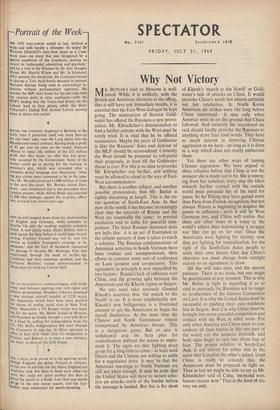Why Not Victory
MR. BUTLER'S visit to Moscow is well- timed. While it is unlikely, with the British and American elections in the offing, that it will have any immediate results, it is essential that the East-West dialogue be kept going. The nomination of Senator Gold- water has offered the Russians a new provo- cation. Mr. Khrushchev's determination to find a further entente with the West must be sorely tried. It is vital that he be offered reassurance. Maybe the price of Goldwater is that the Russians' fears and distrust of the MLF should be reconsidered. Certainly the West should be prepared to soft-pedal their proposals, at least till the Goldwater threat is over. For this is no time to provoke Mr. Khrushchev any further, and nothing must be allowed to stand in the way of East- West accommodation.
But there is another subject, and another possible provocation, that Mr. Butler is rightly discussing at length. This is the en- tire question of South-East Asia. In that part of the world it has become increasingly clear that the interests of Russia and the West are essentially the same : to prevent escalation and to settle for peaceful com- petition. The latest Russian statement does not belie this : it is an act of frustration at the infinite amount of time it takes to reach a solution. The Russian. condemnations of American activities in South Vietnam have been routine and unimpassioned; their efforts to convene some sort of conference on Laos genuine and co-operative. This agreement in principle is now imperilled by two factors : Russia's lack of influence over China, and the growing split between the Americans and the Khanh regime in Saigon.
No one need take seriously General Khanh's assertion that 'the march to the North' is on. It is most emphatically not. Khanh's new belligerence is a frustrated attempt to get, the Americans to begin the march themselves. At the same time the Chinese • and North Vietnamese remain unimpressed * by American threats. This is a dangerous game. But so also is withdrawal and the hazy plan for neutralisation without the means to imple- ment it. The signs are that fighting must go on for a long time to come—at least until Hanoi and the Chinese are willing to settle for a negotiated draw. It may be that the American warnings to North Vietnam are still not plain 'enough. It may be even that the United States will have to mount selec- tive air attacks north of the border before the message is heeded. But this is far short of Khanh's 'march to the North' or Gold- water's talk of attacks on China. It would provoke China's wrath but almost certainly not her retaliation. In North Korea American air strikes were rife long before China intervened : it was only when America went in on the ground that China followed. And certainly the occasional air raid should hardly provoke the Russians to anything more than loud words. They have as much interest in deterring Chinese aggression as we have—so long as it is done in a way which does not overly embarrass them.
Yet there are other ways of taming Chinese aggression. We have argued in these columns before that China is not the monster she is made out to be. She is emerg- ing from her isolation; every step she takes towards further contact with the outside world must persuade her of the need for peace. So far Peking may have gained more than Paris from French recognition, but not always. France is beginning to acquire the power to influence : soon it will be West Germany too, and China will realise that there are other ways to a voice in the world's affairs than maintaining a scrappy. war that can go on for ever. Once the Americans were fighting for victory; now they are fighting for neutralisation, for the right of the South-East Asian people to settle their own future. One day China's objective too must change from outright victory to an agreement.to draw.
All this will take time, and the utmost patience. There is no crisis, but one might be precipitated at any moment. This is why Mr. Butler is right in regarding it as so vital to persuade the Russians not to resign as co-chairmen of the Geneva Convention on Laos. It is why the United States must be successful in pushing their own moderate line in Saigon. And it is why China must be brought into more peaceful competition and contact with the West in other areas. For only when America and China cease to con- centrate all their battles in this one part of the world can the tensions diminish, and both sides begin to care less about loss of face. The proper solution in South-East Asia is not victory for either side in the sense that it implies the other's defeat. Until China is ready to concede this, the Americans must be prepared to fight on. Then at last we might be able to say as Mr. Khrushchev said of Cuba, 'mankind won, human reason won.' That is the, kind of vic- tory we seek.






























 Previous page
Previous page